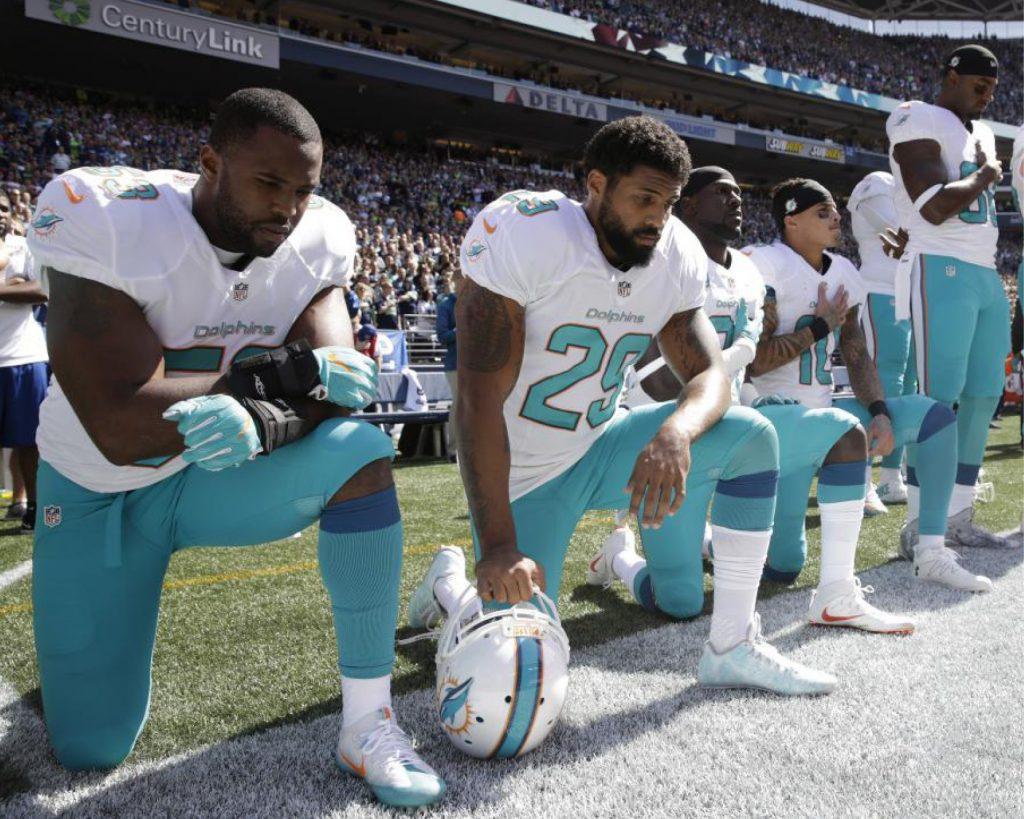Recently, President Donald Trump has been critical of NFL players’ demonstrations, calling owners of NFL teams to ban players who kneel while the national anthem is being played. In response, an increasing number of NFL players have locked arms and kneeled. These acts of defiance are designed as protests against various issues of injustice such as police brutality and racism.
“I think it is good that professional athletes are seeing their ability to influence the political sphere,” said Jonathan Ames, social studies teacher. “In the last ten years or so, I feel like many athletes have not really engaged in the political spectrum. I think that they are not using the potential power they have to change the world. I am a supporter of their ability to protest.”
The NFL protests started with Colin Kaepernick, a free agent quarterback, on Aug. 14, 2016. Kaepernick, in an interview with USA Today, stated that people should not “show pride” in a nation that “oppresses black people and people of color.” Kaepernick first started his peaceful protests by sitting on the bench while the anthem played. Later, he transitioned to taking a knee, garnering more attention and support. Since then, many NFL players have supported Kaepernick through similar acts.
“I think patriotism is in the eye of the beholder,” Mr. Ames said. “I think each individual has the right to approach the flag with any level of respect that is the most comfortable. If I saw someone burning the flag, I would feel uncomfortable because I am patriotic. At the same time, one has the right to protest. I think love for one’s country has a deeper meaning than whether you are standing for the national anthem.”
The debates following these protests have centered on what the justified ways of political expression are. On the one hand, many leaders of the Republican Party have voiced concern over the athletes’ actions. Even amongst NFL fans, support has been divided over this incident. Several of them have admonished the players by burning various sports gear.
“As a fan of the NFL, I am not that affected by the protests,” said Alexander Cha (11), NFL fan. “I am not too interested in politics, and players kneeling do not have that much of an effect on my enjoyment. However, I would understand that some people might get angry if they have very strong patriotic feels about the national anthem.”
On the other hand, the demonstrations have also garnered substantial support, especially from other celebrities. Stephen Curry, NBA player for the Golden State Warriors, decided to decline an invitation to visit the White House in protest of President Trump’s comments. Outside the world of sports, rapper Eminem created a freestyle verse in support of Kaepernick, calling out President Trump for failing to focus on other significant issues such as Puerto Rico’s reconstruction efforts.
“I think the increased awareness of injustice towards the African American population is an important and necessary step in achieving social justice,” said Sky Park (12), Government and Politics student. “For some of the protestors, however, this is merely a political stunt in response to President Trump’s words. Kaepernick’s original motives seem to have been lost in some cases, which is somewhat disappointing. If they truly supported the original cause, they would have had more demonstrations before Trump’s provocations.”
Other NFL players’ demonstrations may have diverged from Kaepernick’s original motives. Instead of protesting against police brutality and racism, many NFL players may be protesting against the President. As celebrities start to be more vocal of their political positions, this clash may indicate the end of their political apathy and silence.

